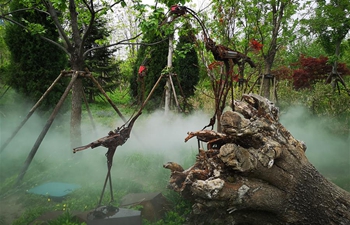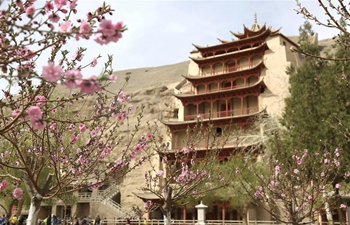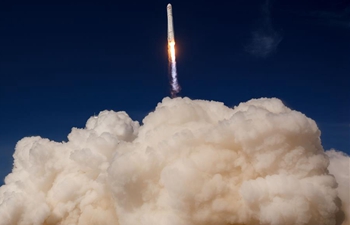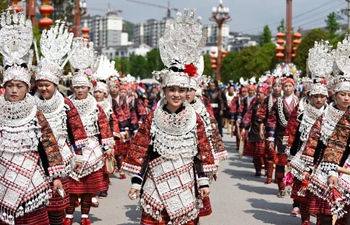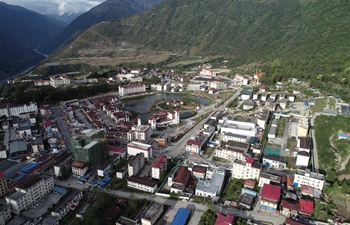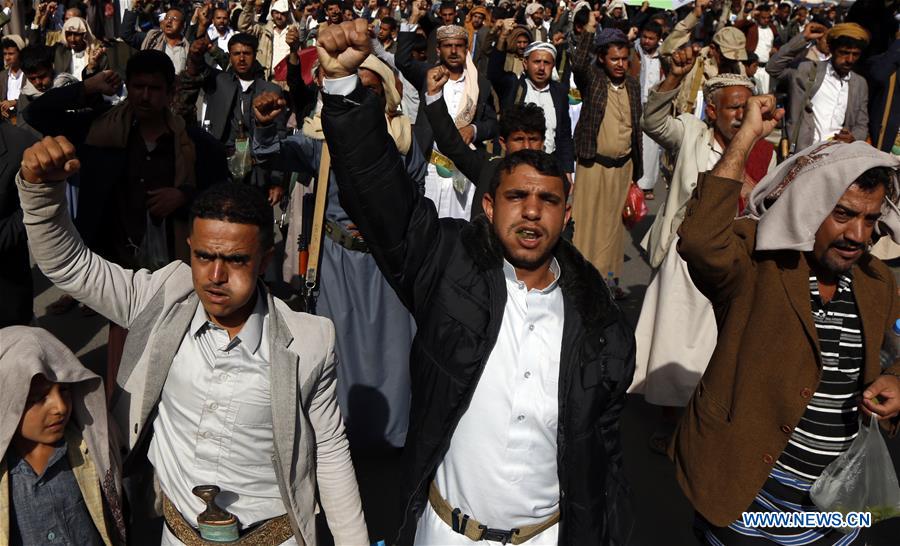
Yemenis shout slogans during a rally in Sanaa, Yemen, on April 19, 2019. Thousands of Yemenis participated in a rally here on Friday against the continuing war and blockade imposed on Yemen. Yemeni political analysts said that U.S. President Donald Trump's veto over a congressional resolution that sought to end the U.S. involvement in Yemen proves the key American role in the war. (Xinhua/Mohammed Mohammed)
by Murad Abdo
ADEN, Yemen, April 18 (Xinhua) -- Yemeni political analysts said that U.S. President Donald Trump's veto over a congressional resolution that sought to end the U.S. involvement in Yemen proves the key American role in the war.
Trump's veto proves the key American role in the Saudi-led military campaign and might work to prolong the country's war, experts said.
They said that the Trump administration has the upper hand in deciding whether to stop the ongoing military operations in Yemen or extending the war despite the humanitarian crisis.
On Tuesday, Trump sent a statement to the senate and called the resolution "an unnecessary, dangerous attempt to weaken my constitutional authorities, and endangering the lives of American citizens and brave service members."
The resolution, which was approved by the Senate last month in a vote of 54 to 46 and the House in early April in a vote of 247 to 175, directs the president to remove U.S. armed forces from hostilities in or affecting Yemen within 30 days unless they are fighting al-Qaida.
Ahmed Nasser Asharif, a political analyst and writer based in the capital Sanaa, told Xinhua that "Trump's veto is just a clear evidence that the current American administration is leading the war against Yemen through its tools in the region."
The Sanaa-based analyst believes that "the decision to end this devastating war will come from Washington one day as the launching of the military campaign was declared from there four years ago."
He said that "the U.S. administration will continue to use the war in Yemen as a means of blackmailing the rich Gulf countries particularly Saudi Arabia and the United Arab Emirates (UAE) and plundering their wealth."
According to Asharif, the ongoing civil war will not see an end in the near future because "Trump wants to achieve his goal and doesn't have a real desire to end the years-long war in Yemen, despite the destruction of Yemen's infrastructure and the killing of Yemeni civilians."
Asharif said that Trump's veto will lead to a continuing debate and "might cause some repercussions between the Congress and the American presidential administration that may leave a positive impact for the interest of Yemen."
On the other hand, some Yemeni observers said that Trump's veto will not have an impact on the ongoing fighting between the Yemeni government forces and the Houthi fighters.
Yaseen Al-Tamimi, a Yemeni political writer and analyst, told Xinhua that "Trump's veto will not have a direct and rapid impact on changing the events or the conflict that is going on in Yemen. It will unlikely affect the UN-sponsored peace process."
Al-Tamimi said that "Trump used the veto just to protect his country's huge interests gained through the relations with the UAE and Saudi Arabia. It is also linked to the arrangements of his overall management for the region."
He added that "it can be said that the shifting in the American administration's attitude toward Iran and the Houthis has nothing to do with the priorities of the Yemeni people, who are keen to defeat the coup and restore their state."
On Wednesday, Yemen's Saudi-backed government welcomed Trump's veto and described it as a confirmation that the United States will continue to provide cooperation and be a partner working side by side with the people of Yemen to restore peace and security.
The statement revealed by the Saudi-backed government said that Yemen is now a frontline battleground against the spread of Iranian aggression and global terrorism.
Yemen's Houthi rebels on Wednesday strongly criticized Trump's veto, saying that "it proved the U.S. complicity in the massacre against the Yemeni people and unjust siege."
The Houthi spokesman Mohammed Abdulsalam said on Twitter the veto "approves that the United States was not only involved in the aggression on Yemen, but also the decision maker of the war while the others follow its decision."
Notably, the UAE, main partner of the Saudi-led coalition, welcomed on Wednesday Trump's veto.
Frustration is growing in Yemen's rebel-held north as the prolonged war and commercial blockade are deepening pains of the residents.
The military coalition led by Saudi Arabia and the UAE intervened in Yemen in March 2015 to support Yemeni President Abd-Rabbu Mansour Hadi after Houthi rebels forced him into exile and seized much of the country's north, including the capital Sanaa.
The United Nations is struggling to save a peace deal between Hadi's government and the Houthi rebels, seen as a hope to end the country's four-year civil war, which has pushed more than 20 million Yemenis to the brink of famine.





